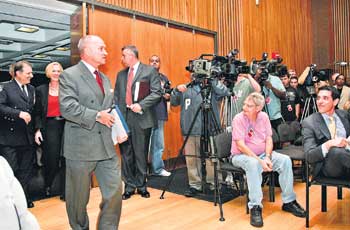
As UNGA sessions begin, there is no dearth of political lunaticsNEW YORK-- Whenever the General Assembly begins its annual sessions in September, the political lunatics are out on the streets beating up on the UN in an annual ritual that has lost all its seriousness. When Fidel Castro addressed the UN in the late 1960s and early 1970s, the anti-Castroites tried to muzzle him with loud demonstrations outside the building.
And when Castro's onetime political disciple Ernesto 'Che' Guevera was inside the UN precincts to address the General Assembly in December 1964, a bazooka fired at the building fell short of its target in what was considered one of the first terrorist attacks on the Organisation. In the early 1970s, there were also several attempts to prevent Yassir Arafat, then leader of the Palestine Liberation Organisation (PLO), from addressing the General Assembly. In one particular year, Arafat was helicoptered into the UN building to avoid the mostly pro-Israeli demonstrators on the streets who had threatened to prevent his entry into the UN precincts. On a second occasion, the General Assembly had to be re-convened in Geneva to facilitate Arafat's participation. The ousted President of Haiti Jean-Bertrand Aristide was once smuggled into the building through the underground UN garage as the streets were filled both with pro and anti Aristide demonstrators. But all of the visitors to New York had a legitimate right to address the General Assembly either because they were heads of state, representatives of their respective governments, leaders of UN-recognized liberation movements or were simply invitees of the world body. Although the demonstrators had the right to protest, they had no authority to prevent these leaders from being at the UN. Even the US, as host country to the UN under what is called the Headquarters Agreement, has no legal right to bar a world leader addressing the General Assembly (unless perhaps he or she has been indicted for crimes by an international judicial body). But still, the US did make an exception in barring Arafat in December 1988. But in an obvious slap to the US administration at that time, the General Assembly decided to re-convene in Geneva. In his now famous speech, Arafat said: "I am both proud and happy to meet with you today, here in Geneva, after an arbitrary American decision barred me from going to you there (in New York). I am proud because I am in your midst and you are the highest rostrum for the problems of justice and peace in the world. I am happy because I am in Geneva, where justice and neutrality are a guidepost and a constitution in a world where the arrogance of power drives some to lose their sense of neutrality and justice." Arafat told delegates that the resolution passed by "your esteemed assembly", with 154 member nations voting to move the session here, was not a victory over the American decision, but "an unprecedented landslide for the international consensus in favour of justice and peace." Still, joining these political rabble-rousers lining up against the UN was a US presidential candidate, the right-wing neo-conservative Mitt Romney, who last week asked Secretary-General Ban Ki-moon to bar Iranian President Mahmoud Ahmedinejad from the UN. In a letter to the Secretary-General, Romney said the Iranian president should be dis-invited, and more ominously, "indicted under the Genocide Convention." That's a threat that could be legitimately held not against Ahmedinejad but against successive Israeli prime ministers for the ongoing genocide in the occupied territories. But Romney, like all US presidential candidates, was sucking up to Jewish voters. "I think the invitation should be withdrawn," Romney told reporters. "I think, instead, Ahmadinejad should be indicted," he said collecting more Brownie points, as he campaigns to be the next Republican President of the United States. Holding out a threat, which he could enforce if he is elected president, Romney said that if the UN fails to withdraw the invitation, "the United States must reconsider its level of support and funding for the United Nations." New York City Mayor, Mike Bloomberg, who also harbours strong political sympathies towards Israel, was at least more realistic when he said: "We will provide whatever security is necessary to protect all visiting dignitaries." Bloomberg rightly said that any guest of the UN "is going to be protected whether I or America agrees with their views." And so, political sanity has prevailed in New York-- even as Sri Lanka's 75 (or is it 85?) member delegation for the General Assembly sessions descends on the Big Apple this weekend. The problem here is not politics, but numbers. |
|| Front
Page | News | Editorial | Columns | Sports | Plus | Financial
Times | International | Mirror | TV
Times | Funday
Times || |
| |
Reproduction of articles permitted when used without any alterations to contents and the source. |
© Copyright
2007 Wijeya
Newspapers Ltd.Colombo. Sri Lanka. All Rights Reserved. |
